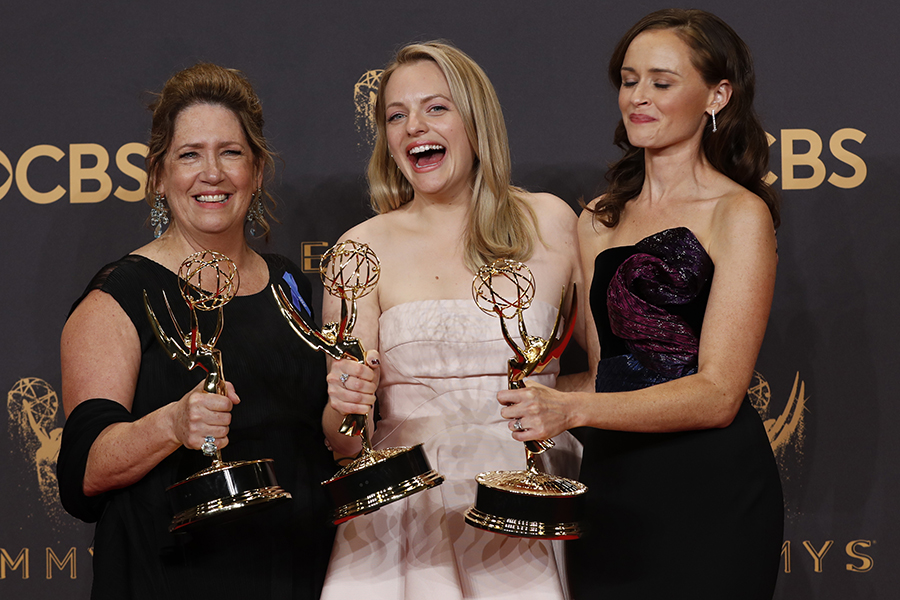Emmys Exemplify Escapism
The 69th annual Emmy Awards prove that TV remains an important cultural outlet for Americans amidst political strife and natural disasters.
PHOTO | Tribune News Service
Ann Dowd, Elisabeth Moss, and Alexis Bledel of The Handmaid Tale in the Trophy Room at the 69th Primetime Emmy Awards at the Microsoft Theater in Los Angeles Sept. 17.
One of many spotlights glides across the stage in an instant, landing on a man dressed in a full tuxedo, standing behind a rolling podium. On the front of podium is a white plaque marked by the words “The Emmys” in blue letters, with a large presidential crest below it. Anyone who watched an episode of this most recent season of “Saturday Night Live” will instantly recognize this latest spoof of a television skit that was now being depicted.
“This will be the largest audience to witness an Emmys- period,” former Press Secretary Sean Spicer said, mockingly. “Both in person and around the world.”
Cameras then displayed shocked faces of celebrities to the nation, returning three different times to Melissa McCarthy, the SNL comedian who recently portrayed a parody of Spicer after the 2016 election.
“Wow, that really soothes my fragile ego,” host and late-night comedian Stephen Colbert said in response to Spicer. “I can understand why you would want one of these guys around.”
This surprise exchange between Spicer and Colbert marked the end of a nearly 20 minute introduction to the 69th Emmy awards held Sep. 17. Celebrities from a variety of cable TV series and online streaming services alike laughed together, perhaps out of discomfort, but the show quickly moved on.
Throughout the entirety of the three hour awards show, history was made with artists, actors, directors and streaming services being recognized in categories they had never been recognized in before. First, Donald Glover was awarded the Emmy for Best Comedy Director for his show Atlanta. This marked the first time that a black man has earned this honor in Emmy history. “Atlanta,” which premiered in 2016, is Glover’s first show he has created, directed and starred in. Glover is also widely known under his rap-stage name Childish Gambino.
“I was so excited when Donald won because I think he has come such a long way in the television industry,” senior Ellie Magsamen said. “I can tell he’s starting to shift away from music and is turning more towards directing and acting. I just really like ‘Atlanta’ and I can’t wait to see what he does next.”
History was made yet again when Lena Waithe won the Emmy award for Best Writing in a Comedy Series for her work in Netflix’s “Master of None” starring Aziz Ansari. Waithe is the first black woman to win this Emmy award and was quoted in her acceptance speech citing her identity and upbringing.
“The things that make us different, those are our superpowers,” Waithe said. “The world would not be as beautiful if we were not in it.”
These historic Emmy awards shed light on progress in the United States. TV should be an outlet for Americans to escape to and should aim to reflect shared values among citizens. The shows which are praised and which win awards should not only be engaging for entertainment value, but should speak about what is important at this time in history.
HBO’s “The Handmaid’s Tale” took home eight Emmy awards, notably the Emmy for Outstanding Drama Series. This adaptation of Margaret Atwood’s 1985 novel finds recent popularity amidst nationwide discussion of politics and women’s rights. Again, this dystopian depiction of society provides a hyperbolic example of the mindset of the American people, and the popularity of this series proves it.
Overall, the 69th Emmy awards provided some much needed comedic relief in the midst of recent natural disasters affecting the southern United States and a general sense of division between political parties and rioters this week. However, the TV series honored at the Emmys did not gloss over these realities of society; instead their creators and their core messages give viewers themes to identify with and take solace in.



